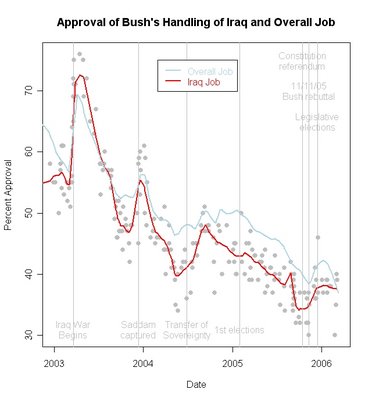
(Click figure and click again for best image quality.)
Since late in 2003, President Bush's overall approval ratings have been higher than approval of his handling of the Iraq war. While the war may have pulled down his overall approval, his standing with the public was higher than it would have been based on the war alone. To be sure both approval rates respond to events in similar ways, and the correlation between the two is quite high, making assertions of which "causes" which tenuous at best.
It is nevertheless interesting to consider the dynamics of each approval rating since the last two months of 2005. In Iraq, signs of some progress appeared in the form of approval of the draft constitution in a national referendum on October 15 and the holding of legislative elections on December 15. Approval of President Bush's handling of Iraq stopped declining close to October 15, and rose through the date of legislative elections.
In the interim, President Bush (and Vice-President Cheney) launched a strong response to the administration's critics on November 11, 2005. Largely focused on the war, the administration sustained a rhetorical campaign of unusual intensity for some 3-4 weeks, until mid-December.
It is interesting that overall job approval did not respond to the Iraq constitutional referendum, but turned sharply around almost exactly on the date of the November 11 White House offensive. In contrast, approval of the President's handling of Iraq does appear to have stabilized shortly before the October 15 referendum, then began a 4-5 percentage point rise starting with the November 11 speech and continuing through the December legislative elections.
The downturn in President Bush's overall approval, however, does not appear to be related to opinion of his handling of Iraq. Iraq opinion has been essentially flat since the first of the year, while overall approval has begun a steep decline since the first week of January.
To the extent these differences are meaningful (and I think they are... to an extent) it seems that the war is not the immediate cause of the President's recent trouble with voters (as some reports of the polls have claimed). It is more likely domestic political failures--- including a lack-luster State of the Union address which failed to set out a policy agenda that could win back former supporters, the Vice-President's awkward handing of the press corps, a Republican report on Katrina and last but certainly not least the difficulty with a Dubai company operating US ports--- that have brought the President to the lowest overall job approval of his tenure.
For the first time since late 2003, the President finds that the war is no longer a drag on his job approval. His overall rating is now worse than the public's view of his handling of the war.